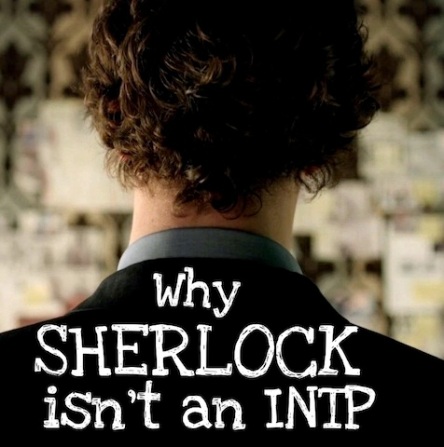
There are several reasons that people often type Sherlock as an xNTP. #1 They don’t fully understand the Jungian functions and are basing their argument in stereotypes… or #2 they don’t fully understand Sherlock as a character, or have rationalised his persona to fit their reality.
Just for you, I’m going to discuss each Jungian function in depth, and explain to you why Sherlock cannot possibly be an INTP…
Fi vs Fe:
Sherlock understands his own feelings a lot better than he understands anyone else’s. When he freaks out about feeling fear in The Hound of Baskerville, it’s not because he doesn’t understand what he’s feeling –it’s #1 because he doesn’t like the idea of being controlled by his emotions, and #2 because he wants to understand the logical reason for why he is feeling those emotions. Usually he’s able to control his emotions to an extent and when he suddenly he finds that he can’t, he knows that there has to be some external cause.
Sure, he doesn’t always know how to handle his emotions, but then, most immature INTJs don’t. My view is that although he understands his feelings, he views them as a weakness and thus, tries to detach from them.
So maybe he wants to be a sociopath, but he certainly isn’t one. (I’m not a sociopath either, but I’ve been called one, and I pass most sociopath tests floating around the internet).

I think too many people confuse tertiary Fe with the NiSe combination. People think that Sherlock naturally understands people’s emotions simply because he’s able to figure them out, but I really don’t think he does.
Here’s why.
When he observes people closely (Se), his conclusions about them (Ni) are always more accurate than when he doesn’t pay close attention to them (thus, his slowness in recognizing Molly’s infatuation). I think an Fe would have noticed a lot quicker and more naturally, whereas, Sherlock has to use the scientific method to figure out people’s emotions.

When he decides to reveal that he’s “not dead” to John, he doesn’t really think about the emotional implications that this will have in John’s life. He fakes his death because he doesn’t want his loved ones to die, but doesn’t consider the fact that it might hurt them more to have him dead than if they died.
A lot of people think that what Sherlock did was incredibly selfless, and in a way it was, but at the same time, his primary reason for doing it was because he was emotionally attached to those people and didn’t want them to die, not because he didn’t want them to hurt. If he didn’t want them to hurt, he would have considered their feelings in his decision, not just their lives.
Ti vs Te:
He’s such an NiTe user that it’s actually funny.
SHERLOCK: Look, it doesn’t matter to me who’s Prime Minister, or who’s sleeping with who…
JOHN: Whether the Earth goes round the Sun…
SHERLOCK: Oh, not that again.
Sherlock cares far more about the use of knowledge, things and people than he does about the idea of them. Have you ever noticed his references to “deleting things?” Sherlock forgets everything that isn’t directly important to his goals. The solar system is irrelevant, so he forgets it. He forgets that we don’t have a current King of England etc.
My roommates recently rented a puppy. Since puppies have no relevance to my life goals, I naturally forgot about it, but my roommates kept bringing it up over and over again as if they could think of nothing else. When I was seventeen, my sister had to explain who Angelina Jolie was to me. Obviously… because Angelina Jolie has no relevance to my life goals.
Anyroad, back to Sherlock.
INTPs tend to be a little bit more indecisive than Sherlock is. Unlike an INTP, Sherlock focuses on one thing at a time. Even when considering all the possibilities, he doesn’t get distracted by anything that doesn’t have a direct correlation to his goals.
INTPs jump from idea to idea, without really caring whether they accomplish something as a result of those ideas. I have a friend who’s an INTP and he’s one of the most indecisive people I know (beaten only by my Dad, also an INTP). My friend constantly talks about ideas, but never implements any of them. Two weeks before both he and I were about to head off to university, he decided out of the blue that he wanted to be a missionary for two years. I haven’t seen him since.

Sherlock is always decisive and typically very predictable in his habits. He knows exactly what he wants, figures out how to get it (Ni) and then goes after it with passion (Te). The most blatantly tell-tale sign that Sherlock is an Te user is how task-oriented he is.
SHERLOCK: Seriously? I just told you that the entire world is run from this house and you want to talk about dinner?
Furthermore, Sherlock needs closure to feel satisfied. Whereas an NeTi user would be satisfied just to analyse information, Sherlock has to see a problem all the way to the end or else he continues to think about it for the rest of eternity (at John’s wedding, he was still thinking about the Mayfly Man, because he never solved it).
Lastly, Sherlock’s thought process rarely stays inside his head. His Ni plans and ideas do, but his thought process happens majorly out loud.
Se vs Si:
The existing arguments for Sherlock being an Si user mostly concern a fundamental misunderstanding of Sherlock’s mind palace.
However, I have the fortunate vantage point of having used the Method of Loci since I was 13. That being said, I understand that while it is a system for memorising information, it is certainly not something an Si user would normally employ (not to say they couldn’t). The reason for this is that the memory palace system operates primarily based off of vivid, visual imagery –not internal facts.

The mind palace is essentially a visual tool that only an Se user would truthfully be able to use in great depth. INTJs tend to think in very concrete terms, which often translates to thinking in images. Sherlock is a visual learner, not an auditory or kinesthetic one. Sherlock very clearly thinks in concrete images. Ever notice how we always see the words that he’s thinking?
The reason for this is that in order to know that a word is the correct one, Sherlock must have a visual image of it in his head. He can’t remember them just by sound –it has to be by sight. And…the very fact that Sherlock needs a system to help him remember things suggests that he isn’t an Si user.
Remember that you can’t assume that just because someone has a really fabulous memory that they are automatically an Si user. That’s an unfortunate stereotype that Tumblr has infused into the minds of millions of the world idiots.

Secondly, Sherlock hates tradition. His approach to everything is unconventional and often socially inappropriate. He doesn’t care about rules (other than the rules of logic) and doesn’t value social conventions (he will leave a wedding early, or walk around in a bed sheet at Buckingham Palace).
Se users are prone to noticing things about their environment that other people miss –Sherlock, obviously. His deductions are typically based off of careful external observations (Se) that then feed his Ni, giving him intuitions about possibilities and liklihoods. The more visual/physical observations he can make about a person, the more accurate his deductions are.

I do this myself –though certainly not to the extent and prowess of Sherlock Holmes.
A few months ago, I covered as a temporary dental assistant and I distinctly recall an older gentleman coming into the office to have his teeth worked on (it wasn’t very busy that day). Based on the type of pants he wore, I figured out that he worked in some form manual labor. His farmer’s tan was also quite noticeable, suggesting that he worked outside.
He had a jacket with a memorialised name and dates of birth-death embroidered on it. The dates suggested that the person had been 35 years old when they’d died and the name was male. Because of corresponding last names I assumed that the name belonged to this man’s son, because the gentleman was roughly 6o years old and the death had occurred about a decade prior.
He had a wedding ring on, so I guessed that he was married and based on the styling of the embroidered jacket I presumed that he most likely rode and loved a motorcycle, but because the jacket was a relatively normal jacket, (not “out there,” or “over the top,”), I determined that he probably rode with his wife, or a single friend, rather than with a large group or gang.
As I worked on his teeth, I talked to him. As it turned out, he was an engineer, but he had a garden that he worked in every day. He had one son that was still alive and another that had died from cancer. He and his wife liked to ride motorcycles together on weekends.
Not too difficult, but it proves the point. Sherlock sees physical evidence, then they logically computes it into a deduction.
Ni vs Ne:
I don’t really think I should need to clarify why Sherlock is an Ni user…but I will.
I’ve heard people claim that Sherlock is an Ne user just because he always wants to be doing something new. Well, guess what, all of those new things involve solving problems (which is basically a necessity for Ni doms).
Sherlock has got to be solving problems otherwise he gets moody and stir crazy. I know exactly how this feels, because when I’m not intellectually stimulated, I start to get depressed and angry at life. In school, I do much better in the hardest classes than I do in easy ones, because I get my energy primarily from problem solving.
Easy isn’t something that INTJs flock to.
Sherlock’s Se observations (which we’ve gone over) feed his Ni, but there are also times where Sherlock knows the answer long before he can logically or empirically prove why it’s true. This is something that’s relatively unique to Ni users –especially Ni dominants.

I, for instance, have been able to pin people down as suicidal upon a first meeting, only later to have to deal with the fallout of a real suicide attempt (this has made me more kind, I think). I’ve also known intuitively that various people that my siblings hung out with were gay years before they came out of the closet. I know which of my co-workers are silently on the verge of a breakup, which are secretly dating each other etc.
The point is, Ni dominants are notorious for knowing things that they’re not supposed to know.
Does this sound like Sherlock? Maybe a little?
It’s a piece of cake for me to intuitively pin down the outcomes of the plots in movies. The first time I watched Broadchurch, I knew who the murderer was within the first twenty or so minutes. Eight episodes later, it turns out I was right.
Sherlock makes intuitive leaps to get the answers (Ni), then rationalises them into logical explanations (Te), going off of his visual memory to provide empirical evidence (Se).
Next, Sherlock makes detailed plans. He improvises only where he has to, but otherwise, his acts only appear to be improvisation because he doesn’t specifically tell others what his plan is. Take a look at His Last Vow if you want a perfect example of Sherlock making long-term plans and carrying them out To. The. Letter.
Then, you see his inferior Se act up when his plan doesn’t work out. Magnussen is actually ahead of him –to the point where Sherlock can’t see any way out and ends up acting in the moment by shooting him. That’s INTJ stress.
Lastly, where INTPs are primarily possibility-focused, INTJs are more focused on probability. Sherlock’s whole theory of deduction (which is actually a theory of induction btw), is completely in line with theories of causation, probability and Ockham’s Razor.
SHERLOCK: If you eliminate the impossible, whatever remains, no matter how improbable must be true.
Sherlock doesn’t try to think up all the possible ways an event could develop. He tries to narrow it down to the one way that events did develop. He’s not interested in possibility where probability is an option.


Think whatever you wish. This is my analysis –educated comments welcome.

He really is an INTJ.
LikeLike
This was interesting to read about, I actually have taken the test you recommended in a different post multiple times prior to reading because I didn’t quite like my typing as an INTJ (because all of the faults my friends and family love to point out are on there). But I consistently was categorized as INTJ. Your insights are very fun to read and I look forward to implementing some of the thought and behavioral processes mentioned in some of your posts to get the most out of my type.
First of which will likely be trying to fully flesh out the Fi I ditched and left stagnant in high school for various reasons…
Thanks for the posts and the food for thought
LikeLike
For me as a intp i think Sherlock is the god version of an intp/intj
He’s for me more likely to be an intp but that’s just on my mind
LikeLike
Wrong! wrong! Almost wrong!
LikeLike
Sherlock is INTP for me.
LikeLike
Yoooou just proved Sherlock is an INTJ mate
LikeLike
INTJ are Jim Moriartis. Just talk to them you will see
LikeLike